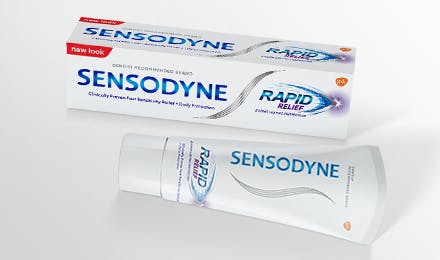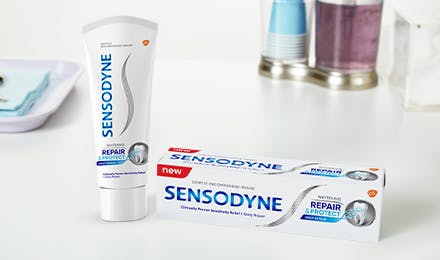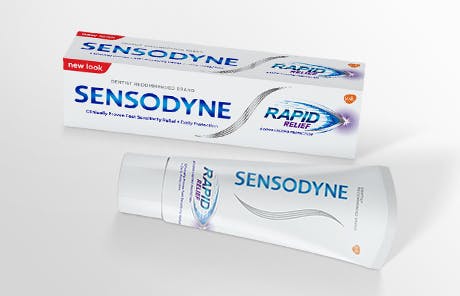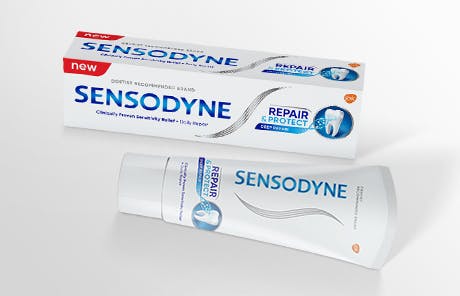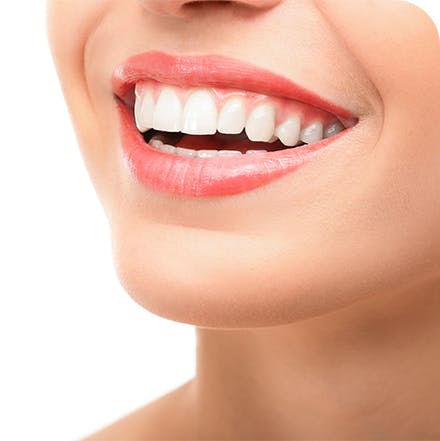Find the Best Whitening for Sensitive Teeth
Teeth-whitening products often have a bad reputation when it comes to tooth sensitivity. They can be overly abrasive, acidic or contain bleaching agents such as peroxide that irritate the gums and damage the teeth. Yet the good news is, there are much gentler teeth-whitening products that care for your mouth while restoring natural whiteness.
It’s small wonder that many of us are in search of teeth-whitening solutions; our teeth can easily become discoloured as we enjoy our day-to-day life. Red wine, coffee and cigarettes are some of the most common culprits, but staining can also be caused by highly pigmented foods such as balsamic vinegar and turmeric.
If you suffer from sensitive teeth and want a brighter, pain-free smile, read on to learn how to manage sensitivity while discovering the most effective sensitive-teeth-whitening toothpaste.
WHAT CAUSES SENSITIVE TEETH?
There’s a whole host of reasons why you may experience the short, sharp twinge of sensitivity. Getting to the bottom of what’s causing your sensitive teeth can help you select the best method for pain-free whitening. Sensitive teeth are commonly caused by:
- Worn or damaged enamel, which makes the soft dentine inside our teeth vulnerable. This can be the result of poor brushing, teeth grinding or something as simple as consuming food and drink high in sugar and acid.1
- Extreme temperatures or textures can trigger tooth sensitivity, such as biting into a tart, crunchy apple or walking into a chilly wind.2
- A one-off accident or trauma such as a broken tooth or a loose filling can cause temporary pain.3,4
- Receding gums, caused by overbrushing or gum disease, which exposes the nerves inside the tooth.5
EIGHT PAIN-FREE TIPS FOR WHITENING SENSITIVE TEETH
The great news is, there are effective ways you can manage sensitivity while taking at-home steps towards a whiter, brighter smile. These include a good oral hygiene routine as well as simple lifestyle changes.
Here are eight top tips on whitening for sensitive teeth:6
- Brush twice a day for two minutes using a fluoride-based toothpaste such as Sensodyne Daily Care Gentle Whitening, which has a superior whitening action* and provides long-lasting sensitivity care.
- Use a toothbrush designed to remove stains gently.
- Once a day, clean between your teeth with an interdental brush or floss.
- Limit the amount of tea, coffee and red wine you drink – these everyday drinks are the most common causes of stained teeth. Rinsing your mouth with water after drinking or adding milk to your tea and coffee can minimise discolouration.
- Cut back on sweets and sugary foods. Instead, opt for foods that are good for your teeth such as crunchy vegetables or cheese.
- Avoid smoking; it has a detrimental effect on the health and colour of your teeth.
- Visit your dentist and your oral hygienist for regular check-ups.
- Speak to your dentist before you undergo any teeth-whitening procedures; they can advise on the best treatments for you.
HOW SENSODYNE SENSITIVE WHITENING TOOTHPASTE CAN HELP
With so many teeth-whitening products available, finding the right one for your sensitive teeth can feel overwhelming. To restore your smile, explore the full Sensodyne range, which features whitening toothpastes, to find the product best suited to your teeth.
We recommend the Sensodyne Sensitivity and Gum Whitening toothpaste and the Sensodyne Daily Care Gentle Whitening toothpaste, which protect teeth and gums while gently removing stains to restore natural whiteness. Use these with the Sensodyne True White Toothbrush; its bristles are designed to remove stains and the plaque that contributes to sensitive teeth.
*versus previous formulation
Sources: Clicking any of the links below takes you to an external website that is independently operated and not managed by Haleon. Haleon assumes no responsibility for the content on the website. If you do not wish to leave this website, do not click on the links below.
- Sensitive Teeth, NHS Dentist. https://www.nhsdentist.com/sensitive-teeth; Accessed 19/02/2020. Referenced text is highlighted in source PDF.
- Sensitive Teeth, NHS Dentist. https://www.nhsdentist.com/sensitive-teeth; Accessed 19/02/2020. Referenced text is highlighted in source PDF.
- Trauma To The Teeth, Cambridge University Hospitals. https://www.cuh.nhs.uk/addenbrookes-hospital/services/oral-and-maxillofacial-surgery-and-orthodontics/trauma-teeth; Accessed 19/02/2020. Referenced text is highlighted in source PDF.
- Toothache, NHS Direct Wales. https://www.nhsdirect.wales.nhs.uk/encyclopaedia/t/article/toothache/; Accessed 19/02/2020. Referenced text is highlighted in source PDF.
- Gum Disease, NHS. https://www.nhs.uk/conditions/gum-disease/; Accessed 19/02/2020. Referenced text is highlighted in source PDF.
- Toothache, NHS Direct Wales. https://www.nhsdirect.wales.nhs.uk/encyclopaedia/t/article/toothache/; Accessed 19/02/2020. Referenced text is highlighted in source PDF.


